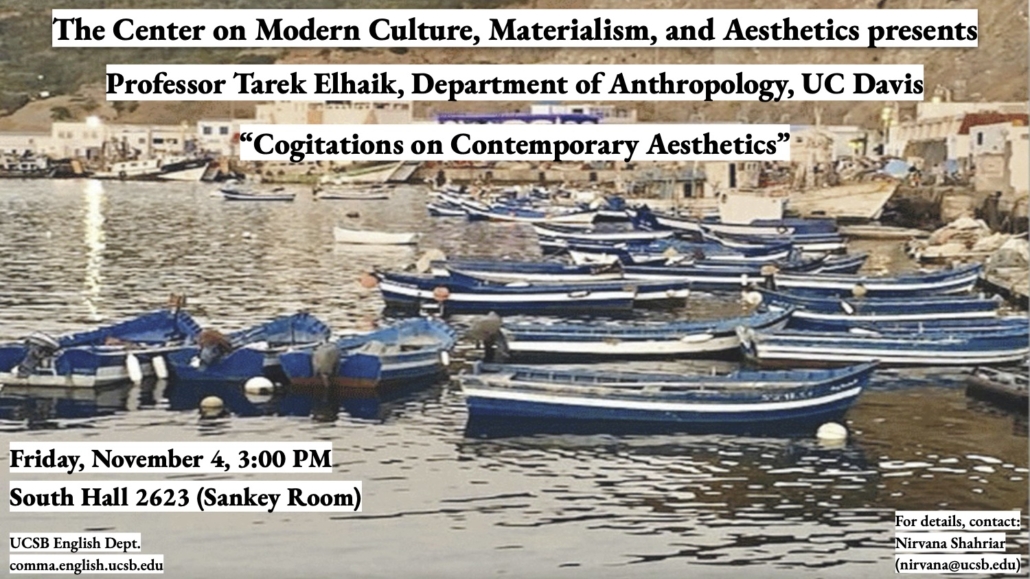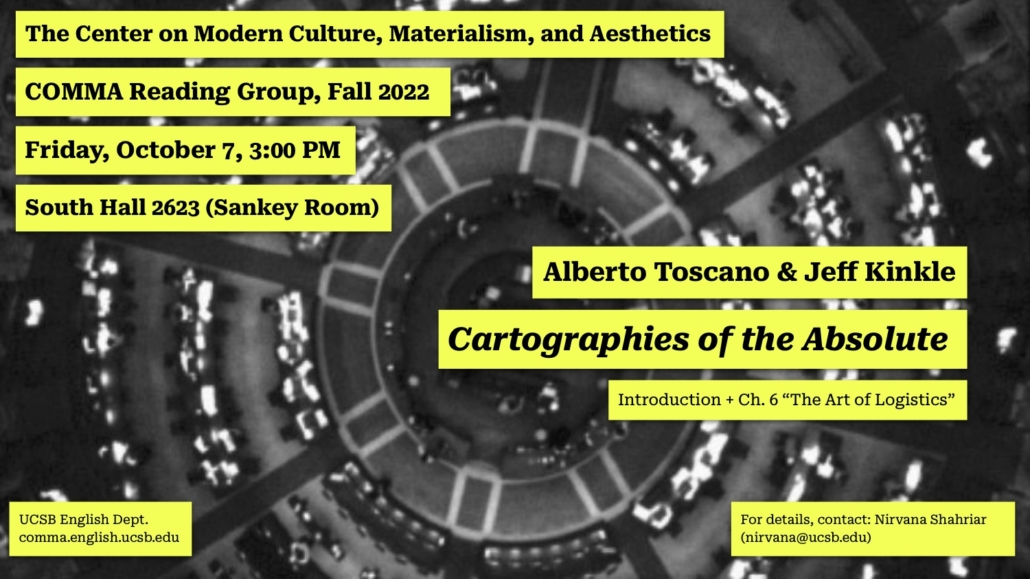COMMA Talk 2022-23
Friday, May 26, 3:00–5:00 p.m.
The Sankey Room, South Hall (second floor)
We invite you to a talk: Professor Caren Irr (Brandeis University):
“Bridging the Metabolic Rift with Tom Comitta’s The Nature Book”
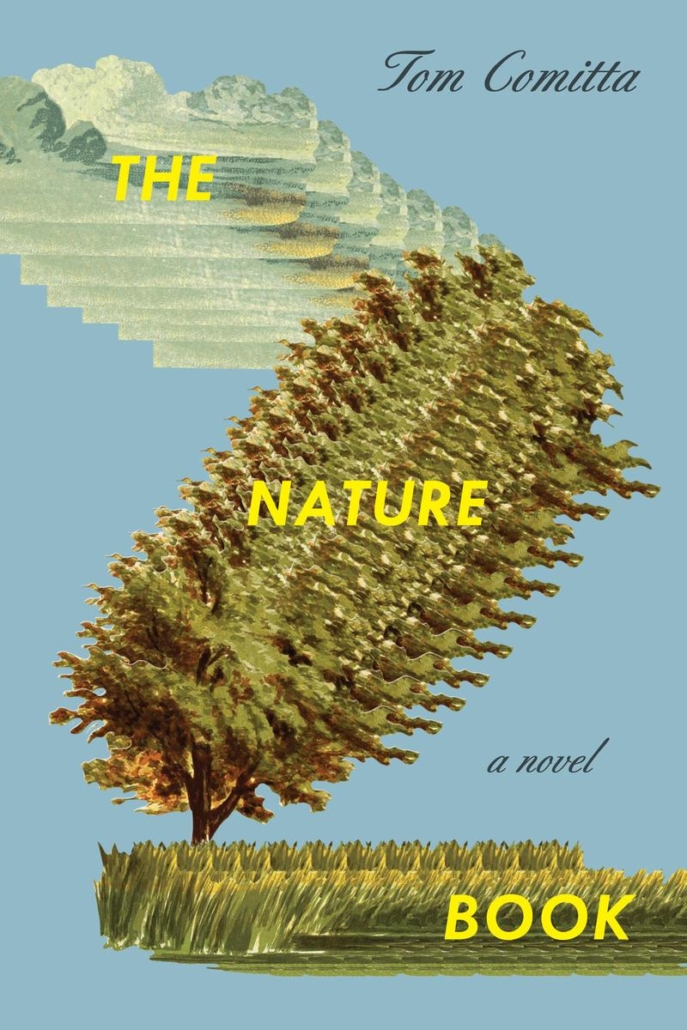
Environmental sociologists have long identified the rise of capitalism with the so-called metabolic rift. This disruption of a sustainable cycle of consumption and production occurs with urbanization and the global redistribution of nutrients and pollutants around centers of human population. After the seismic upheavals of the metabolic rift, high concentrations of waste accumulate, and pre-capitalist routines of renewing the soil, forests, and oceans fall into disarray. To rebalance this unstable situation, John Foster Bellamy, Jason Moore, and others propose a revolutionary reorganization, one that shifts relations of figure and ground. They envision embedding human communities and needs within nature rather than treating nature as a static resource to be plundered for human profit. Dissolving the anthropocentric figure into the ground of nonhuman nature, as it were, becomes the primary formal requirement for an environmentally sustainable future.
While this conception of ecosocialist transition does not lack critics, it has inspired some intriguing positive responses. In particular, Tom Comitta’s The Nature Book (2023) experiments with the reversal of figure/ground relations. A cut-up comprised solely of descriptions of nonhuman nature drawn from the Anglophone literary canon, Comitta’s work reveals the aesthetic benefits of working within Oulipo-style formal constraints. Their narrative (which more closely resembles conceptual art than a novel) challenges the reader’s capacity for discovering new varieties of ecosocialist pleasure. Through active peripheralization of representations of human figures and their effects, Comitta’s project enlivens readerly encounters with the “ground.” In so doing, it provides training in the cognitive and perceptual skills needed to bridge the metabolic rift. Comitta’s self-styled “supercut” or archive of found language brings to literature some of the benefits of an aesthetics of slowness in other media (most notably, slow cinema). Together, these ecologically minded art forms call into being partial subjects oriented toward a sustainable post-capitalist future.Professor Caren Irr, Kaiserman Professor in the Humanities at Brandeis, is the author of Towards the Geopolitical Novel: U.S. Fiction in the 21st Century (Columbia 2014), Pink Pirates: Contemporary American Writers and Copywright (Iowa, 2012), the editor of Life in Plastic: Artistic Responses to Petromodernity (Minnesota 2021) and the co-editor of many others, including Minima Moralia in the 21st Century: Fascism, Work, Ecology (Bloomsbury, 2021) and of Rethinking the Frankfurt School (SUNY, 2002) and of On Jameson (SUNY, 2005).
COMMA Talk, 2022-23
Juan Evaristo Valls Boix, Professor of Philosophical Anthropology, the Complutense University of Madrid
“Towards a Vindication of the Right to Laziness from Anarchy to Paradox”
The talk examines the philosophical foundation of the right to laziness, a right that imposes a limit to the capitalist exploitation of bodies and reclaims life that is not governed by merit or economic logic. Strike, laziness, retirement, play or disconnection have been the subject of important philosophical thought (Lafargue, Benjamin, Luxemburg), but only very few studies offer a systematic reflection on the anti-capitalist potential all these tactics share. They need to be defended as rights that may grant an intrinsic value to life, beyond its utility or profit.
Juan Evaristo Valls Boix is Professor of Philosophical Anthropology at the Complutense University of Madrid. He has been Adjunct Professor in Aesthetics and Contemporary Philosophy at the University of Barcelona, and post-doctoral fellow at the University of California, Riverside. He is currently interested in the poetics of inoperosity and the politics of desire within the framework of a critique of neoliberal subjectivity. He is the author of the essays Giorgio Agamben. Política sin obra (Gedisa, 2020) and Metafísica de la pereza (NED Ed., 2022). The title of his current project is The Right to Beautiful Things (forthcoming: Ariel, 2024).
Prof. Glyn-Salton Cox, 1983-2022
In Memoriam
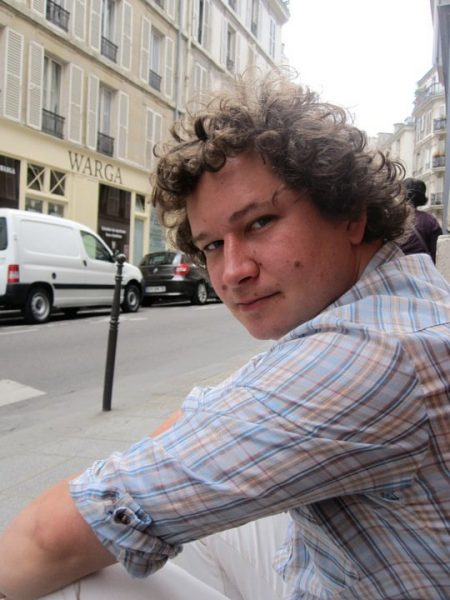
In Memoriam
With profound sadness, the COMMA center of the English Dept. at UC Santa Barbara memorializes our esteemed and cherished colleague and friend the late Glyn Salton-Cox, who passed away suddenly and unexpectedly as 2022 ended. Our thoughts are with his wife Beth Sadler, his parents, brother, sister-in-law and extended family in the United Kingdom, and with his many friends on both coasts of the US, in Britain and around the world, as well as his students, past and present. With all of them, we deeply mourn Glyn’s passing.
Glyn Salton-Cox came to UC Santa Barbara as an Assistant Professor of English nine years ago, a specialist in twentieth- and twenty-first century literature and culture. He arrived with an already glittering academic record: he earned his BA degree, and then an MPhil. in Criticism and Culture, from Kings College, Cambridge, followed by a PhD in English from Yale. At Cambridge he won the Rylands Prize for top performance in English; at Yale, the English Dept. Prize for the best published essay by a graduate student. At UC Santa Barbara, he soon became affiliated with the Departments of Feminist Studies and with History, suggesting on the one hand, his deep and activist commitment to gender studies, and, second, his scholarly modus of extensive archival research to uncover previously marginalized figures and stories. From the first, he was a mainstay of COMMA, where he memorably presented his own work, and where he could always be counted on for strong arguments, striking readings of the knottiest of theoretical texts, and brilliant insights. With a colleague in Film Studies, in 2016 he co-organized, under the auspices of the IHC, an ambitious conference on one of his own intellectual heroes, the Hungarian Marxist theorist, literary critic and philosopher of aesthetics Georg Lukacs. His first book, Queer Communism and the Ministry of Love: Sexual Revolution in British Writing of the 1930s, was published by Edinburgh University Press in 2018; he was researching and writing his second monograph, on the lumpenproletariat, at the time of his death. Along with a Cambridge colleague, he guest-edited a special issue of Critical Quarterly on ‘The Long 1930’s.’ He has published numerous articles, essays and reviews, and spoken at all of the major conferences in his field on two continents, on topics ranging from the forms of queer communism in 30’s Britain to recent revisionist biographies of George Orwell. At UCSB, he taught graduate seminars on Marxism and queer theory, senior seminars on such topics as ‘Good Comrades and Splendid Creatures: Queer Leftists in Literary Culture,’ and popular undergraduate courses on urban literature, sexual revolutions and twentieth-century prose, and ‘British Comedy and the End of Empire.’ Promoted to Associate Professor in 2019, he directed or was a member of at least ten PhD dissertation committees. Glyn was awarded the English Department Outstanding Graduate Mentor Award in 2017. He was a stalwart member of COMMA, the Center on Modern Literature, Materialism and Aesthetics in the English Dept.
Glyn was a critic and writer of distinction. His academic research, written invariably with his characteristic brio and style, was noteworthy, first, for the joy he took in rediscovering and celebrating writers whose political activism had led to their work being diminished or ignored, and, second, for his explorations of the ways in which sexual revolutions and political revolutions depended on each other and sustained each other. In his own field of 20th. Century Anglophone letters, he worked to bring writers who had been marginalized for their queer sexuality and their radical politics the respect and prominence they deserved; the founding principle of his criticism was that the personal was always political. In his telling, people courageous enough to demand sexual freedom for themselves were the very ones to demand justice on many fronts for everyone. He was proud to have uncovered the political commitments and influences of figures who had often been dismissed even by the British left as mere eccentrics. Hi knowledge of German allowed him to trace complex webs of transmission by which the ideas of radical thinkers in Eastern Europe could reach those in the west, to be remolded by them. Here his archival enthusiasm was crucial, but it was always motivated by his determination to understand how the materialist analysis of social relations matters today. His latest work on the lumpenproletariat promised a major new reading of the cultural and political power of the wretched of the earth.
For all memebrs of COMMA, who have known Glyn for this past decade, his passing leaves a tremendous sense of loss. No one can but believe that here was a brilliant mind with so much more work to be done, ideas to be generated, important works published. Glyn will also be remembered as the kindest, the most convivial and the most generous of colleagues. Whether seated at the long table in the CRC poring over a book in pre-Covid days, explaining the intricacies of a New Left debate about a Grundrisse translation at a COMMA meeting, making clear to his students that in their questioning of gender norms they had his full support, or simply modeling for all of us the pattern and possibilities for a committed, flexible, humorous and open-minded left intellectual in the US university and beyond, Glyn Salton-Cox was a brilliant scholar, a distinctive intellectual, and a writer who has left his own trace upon debates on British twentieth-century culture. A superb voice has been lost to us. We will not see his like again.
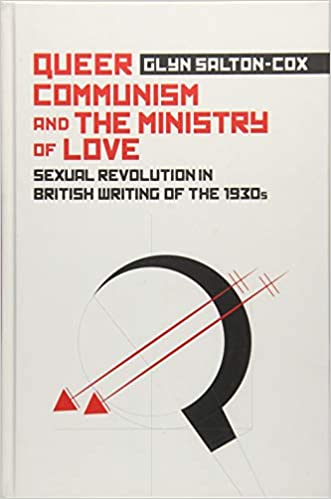
COMMA Reading Group, 2021-2022: Bio/Culture/Capital



